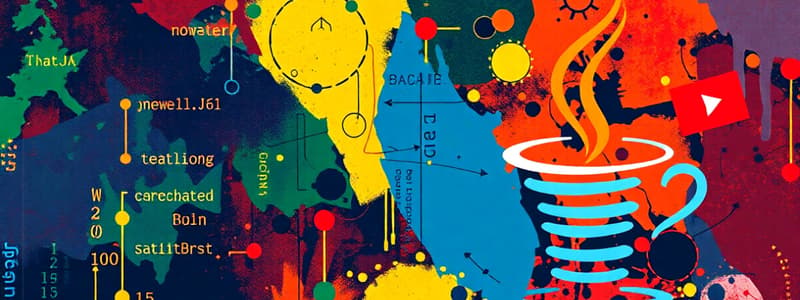Podcast
Questions and Answers
What type of programming is focused on creating objects rather than procedures?
What type of programming is focused on creating objects rather than procedures?
- Procedural programming
- Functional programming
- Object-oriented programming (correct)
- Routine programming
Which statement accurately describes RAM?
Which statement accurately describes RAM?
- It has no relation to the processor.
- It is a volatile type of memory. (correct)
- It is a type of input device.
- It is used for permanent storage.
What is a potential consequence of logical errors in a program?
What is a potential consequence of logical errors in a program?
- The program produces erroneous results. (correct)
- The program compiles successfully but never runs.
- The program crashes at runtime.
- The program produces an infinite loop.
What term describes the protection of an object's internal data from outside access?
What term describes the protection of an object's internal data from outside access?
Which extension do Java source files NOT have?
Which extension do Java source files NOT have?
Which of the following best describes application software?
Which of the following best describes application software?
What is the primary purpose of validating program results?
What is the primary purpose of validating program results?
Which statement is true about the contents of a variable during program execution?
Which statement is true about the contents of a variable during program execution?
What is the purpose of application software?
What is the purpose of application software?
Which statement is true about Java byte code?
Which statement is true about Java byte code?
What is the significance of a semicolon in Java?
What is the significance of a semicolon in Java?
Which of the following accurately describes variables in programming?
Which of the following accurately describes variables in programming?
What is the central processing unit (CPU) composed of?
What is the central processing unit (CPU) composed of?
What describes what happens during a runtime error?
What describes what happens during a runtime error?
Which of the following is typically NOT considered a major component of a computer system?
Which of the following is typically NOT considered a major component of a computer system?
What does pseudocode primarily serve as in programming?
What does pseudocode primarily serve as in programming?
What characteristic is associated with data hiding in objects?
What characteristic is associated with data hiding in objects?
Which of the following options correctly describes keywords in programming languages?
Which of the following options correctly describes keywords in programming languages?
What is the primary function of a programming language?
What is the primary function of a programming language?
What is typically not included within the definition of firmware?
What is typically not included within the definition of firmware?
What is the importance of the Java Virtual Machine (JVM)?
What is the importance of the Java Virtual Machine (JVM)?
What is a procedure in programming?
What is a procedure in programming?
Flashcards
Logical Errors
Logical Errors
Errors that cause a program to produce incorrect results, even with valid syntax.
Java Virtual Machine (JVM)
Java Virtual Machine (JVM)
A virtual machine that executes Java byte code.
Semicolon (;)
Semicolon (;)
Marks the end of a statement in Java.
Java File Extensions
Java File Extensions
Signup and view all the flashcards
Encapsulation
Encapsulation
Signup and view all the flashcards
Solid-State Drives (SSD)
Solid-State Drives (SSD)
Signup and view all the flashcards
Application Software
Application Software
Signup and view all the flashcards
Variable
Variable
Signup and view all the flashcards
Hardware
Hardware
Signup and view all the flashcards
Data Hiding
Data Hiding
Signup and view all the flashcards
Pseudocode
Pseudocode
Signup and view all the flashcards
Keywords
Keywords
Signup and view all the flashcards
Object
Object
Signup and view all the flashcards
Syntax
Syntax
Signup and view all the flashcards
Procedures
Procedures
Signup and view all the flashcards
CPU
CPU
Signup and view all the flashcards
Byte
Byte
Signup and view all the flashcards
Runtime Errors
Runtime Errors
Signup and view all the flashcards
Computer Program
Computer Program
Signup and view all the flashcards
Program's Sequence
Program's Sequence
Signup and view all the flashcards
Validating Program Results
Validating Program Results
Signup and view all the flashcards
Byte Code
Byte Code
Signup and view all the flashcards
Study Notes
True/False Statements
- Logical errors produce incorrect results despite valid syntax.
- The Java Virtual Machine (JVM) executes Java byte code instructions.
- Java statements terminate with a semicolon, not a colon.
- Compiled byte code is distinct from source code.
- Application software enhances computer usability for users.
- Each byte in memory has a unique identifier known as an address.
- Encapsulation combines data and code within a single object for protection.
- Java source files use the .java extension, while compiled files use .class.
- Procedures are sequences of statements performing specific tasks.
- Solid-state drives (SSD) are faster than traditional disk drives and have no moving parts.
- Computers serve various professional roles, resisting simple categorization.
- Software is essential for computers to function, relying on programmers.
- Variables can change values during program execution, contrary to some misconceptions.
- Data hiding within objects protects against unauthorized access and corruption.
Multiple Choice Insights
- Procedural programming focuses on procedures, while object-oriented programming emphasizes object creation.
- Random Access Memory (RAM) is volatile memory used for temporary storage.
- The main programming methodologies today are procedural and object-oriented.
- Validating program results ensures the original problem is addressed accurately.
- Software encompasses all computer programs, distinct from hardware.
- Objects provide outside access through methods, while hiding internal data.
- Variables are symbolic names associated with memory locations in programs.
- Hardware refers to the physical components of a computer system.
- Data hiding allows only an object's methods to modify its data, enhancing safety.
- Java byte code is universally compatible, making Java programs highly portable.
- Pseudocode acts as a bridge between human languages and programming languages.
- Byte code is interpreted by the JVM for execution based on the compiled code.
Java Programming Essentials
- Keywords in programming have specific, predefined meanings within the language.
- Computers’ programmability enables them to perform a variety of tasks.
- An object is a software unit that encapsulates both data and procedures.
- Application software includes programs that enhance user productivity.
- The end of a Java statement is denoted by a semicolon.
- Syntax refers to the rules governing the structure of programming languages.
- Procedures group statements to accomplish specific functions efficiently.
- The CPU comprises the control unit and the arithmetic/logic unit (ALU).
- A byte consists of 8 bits, the smallest addressable unit of digital information.
- Runtime errors often stem from logical errors within the program.
Computer Programming Fundamentals
- A programming language is essential for writing computer programs.
- Hardware represents the tangible parts of a computer system.
- A computer program consists of instructions enabling problem-solving.
- All components—CPU, input/output devices, memory—are crucial to a computer's operation.
- Java's original name was Oak.
- A program's sequence of instructions resides in the computer’s memory.
- Byte code is executed and interpreted through the JVM.
Development and Compilation
- Java was initially developed by Sun Microsystems.
- The command
javac ReadIt.javacompiles Java programs. - To execute a compiled Java program, use
java ReadIt.
Studying That Suits You
Use AI to generate personalized quizzes and flashcards to suit your learning preferences.




